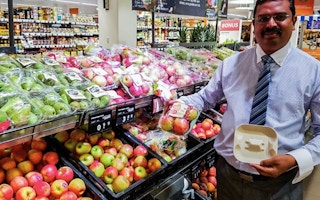Air pollution has been an ongoing problem in many countries in South-east Asia, and Malaysia is one of the worst affected. Each year, a smoky haze blankets the country for months on end.
Although most of the smoke is produced by ‘slash and burn’ during forest clearance in neighbouring countries, one of the other main causes of the haze is the burning of rice straws in Malaysia itself.
After each seasonal harvest, farmers burn rice straw to help prepare the soil for the next crop. The practice releases nutrients back into the ground and helps with pest control.
But the burning of an estimated 2.5 million tonnes of paddy straw after the harvest creates clouds of smoke that contribute to a haze that plays havoc on roads and hampers commercial flight operations from regional airports.
The air pollution index often reaches dangerous levels, forcing schools to close. Large numbers of people in nearby villages and towns suffer from respiratory problems, like asthma. Sometimes, the haze completely blocks out the sun.
“
Instead of letting the paddy husks go to waste, we’ve come up with a solution - converting rice straw and husks into biodegradable packaging.
Ramaness Parasuraman, chief executive officer, Free the Seed
Biotech process
The company uses its patented biotechnology process to produce packaging products that once used organically compost within six months.
‘Cooking’ the cellulose fibrous rice straws and husks to 400 degree Celsius temperatures in a closed loop oxygen chamber makes the straws moldable.
Then the pulp is blended with the latex from unripe papaya skins, extracted using a method that does not damage the fruit (so that the fruits can still be sold at the markets).
The pulp is then molded into packaging products which, thanks to the protease enzymes in the papaya latex, rapidly degrade into compost when they come into contact with moisture and heat.
Parasuraman says, “Our product is protected by two intellectual properties, one of which relates to the distinct competitive advantage in the low-cost novelty formulation in delignifying the cellulose fibres and the other to low-cost of papain-protease enzymatic impregnation to accelerate the composting rate with lower CO2 emissions.”
Global Cleantech Innovation Programme
Free the Seed’s progress was given a big boost when, in 2014, the company was selected as the national winner of the Global Cleantech Innovation Programme (GCIP) for SMEs in Malaysia, a programme that leverages the power of entrepreneurship to address challenging energy, environmental and economic problems.
The Global Cleantech Innovation Programme for SMEs in Malaysia is implemented by the Malaysian Industry-Government Group for High Technology (MIGHT) and the United Nations Industrial Development Organization UNIDO), and is funded by the Global Environment Facility (GEF). It aims to develop a platform to nurture and accelerate the next generation of Malaysian cleantech entrepreneurs.
The 2014 round of the GCIP-Malaysia Competition and Accelerator Programme attracted over 60 applicants and 26 semi-finalists were selected to take part in the four-month Accelerator Programme.
As the winner of the contest, Free the Seed received US$30,000. Parasuraman was invited to take an all-expenses-paid trip to San Francisco to attend the Cleantech Open Global Forum in Silicon Valley to receive the award and make connections with potential partners, customers and investors from around the world.
Parasuraman, told UNIDO’s Making It magazine that participating in GCIP was a game-changer for the company’s business. “The GCIP platform provides a unique, result-oriented platform for start-ups and green tech entrepreneurs for funding access and market access. We also benefitted from participating in international conferences organized by UNIDO, GEF and MIGHT.”
Additional income for farmers
A US$4m production factory has been constructed on a 10-acre site in Gurun in Kedah state, and the first phase of the business began in 2015, when Free the Seed secured a 10-year supply agreement for rice straw biomass with the Kedah state farmers’ associations.
Parasuraman said there has already been a direct impact on the lives of more than 1,300 farmers who each receive an average additional income of US$300 per year by selling previously burnt waste rice straw to Free the Seed.
The number of farmers taking part in the scheme is expected to grow to 30,000 as the project goes full stream during 2017, and around 32,000 hectares of rice fields are expected to achieve zero open burning.
This article was republished with permission from the United Nations Industrial Development Organization (UNIDO).










